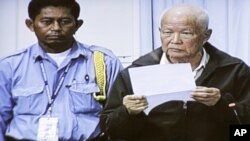Jailed Khmer Rouge leader Khieu Samphan told judges at the UN-backed tribunal on Thursday he was “ready” to cooperate with the UN-backed court and to explain some of the actions of the regime while he was nominally president.
Khieu Samphan spoke on the fourth day of a preliminary hearing that opens the way for a full trial of four Khmer Rouge leaders later this year. Many Cambodians who attended the hearing said they hope they will receive some justice for the atrocities perpetrated by the regime more than 30 years ago.
“I think this is a very important moment for me and for my fellow Cambodian citizens who are hungry to understand what happened between 1975 and 1979,” Khieu Samphan, who is nearing 80, told the court.
He and three other regime leaders—Nuon Chea, Ieng Sary and Ieng Thirith—are charged with war crimes, crimes against humanity and genocide, among other crimes, for their leadership role in a regime that oversaw the deaths of an estimated 1.7 million people. All four have denied responsibility for the atrocities committed by the Khmer Rouge.
Khieu Samphan told the court he had been “waiting for this opportunity for a long time.”
“As long as I’m healthy, I will contribute all my strength and energy to the work of the court, to make clear what happened,” he said.
He also pleaded with the court to allow the witnesses submitted by his defense team.
Court prosecutors told reporters Thursday they considered the four days of hearings a success, although defense lawyers for Nuon Chea and Ieng Sary said they were disappointed the court had not considered all of their arguments. Cambodian prosecutor Chea Leang welcomed Khieu Samphan’s participation in the upcoming trial.
The week provided a glimpse of the court’s work for some Cambodians, who sat as audience members outside the main courtroom.
Pen Soeun, a 56-year-old from Svay Rieng province, said he did not want the four senior leaders to escape justice, even as their lawyers argued for their release.
“The lawyers of the accused have a high professionalism and very good legal interpretation to help their clients be free of charges from the court,” he said. “But I think about, what is law, and what is the judicial process? In my consideration of the hearing activities, I think the four [defendants] cannot escape the law.”
Sum Rithy, 51, said there was sufficient evidence, in his mind, to bring about guilty verdicts for the accused. And Meas Phally, 54, said even if the trial did not bring “100 percent justice,” the suspects “must be punished.”




